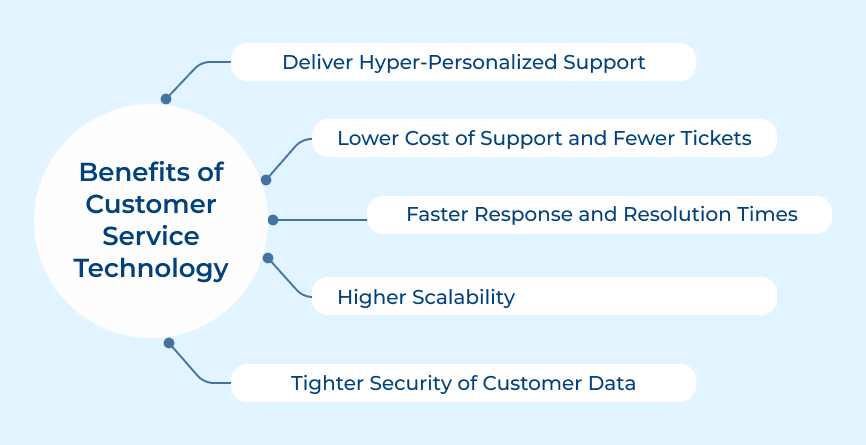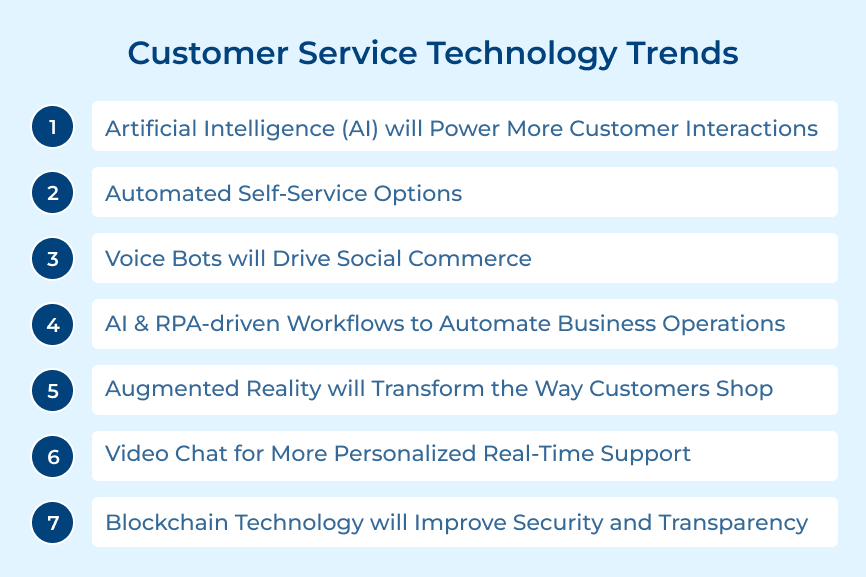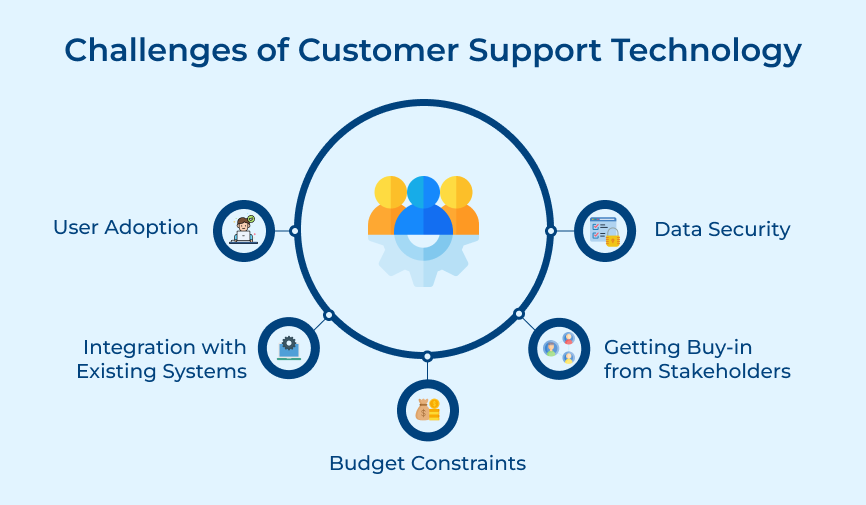1. Artificial Intelligence (AI) Will Power More Customer Interactions
Artificial intelligence (AI) holds immense potential to revolutionize the customer service industry. The advent of conversational AI and chatbots powered by natural language processing (NLP) technology has already paved the way for 24/7 customer service. 65% of customer service decision-makers aim to invest in chatbots to drive operational efficiencies and customer satisfaction.
The AI-powered customer support platforms can minimize customer wait times and provide quicker responses. They allow businesses to satisfy customer expectations more effectively and efficiently. Customers now expect more sophisticated AI-powered experiences, such as personalized product recommendations and targeted marketing.
Pro tips:
- Train your AI systems with diverse customer interaction data and regularly update the knowledge base to improve response accuracy.
- Implement a seamless handoff protocol between AI and human agents to handle complex queries that require personal intervention.
2. Automated Self-Service Options
Self-service options such as chatbots, interactive voice response (IVR) systems, and in-app customer support have become increasingly popular with businesses as well as customers. The self-support platforms offer a faster way for customers to resolve their queries and access information.
Advancements in natural language processing (NLP) technology have enabled chatbots to mimic human interaction more closely. Companies can now provide a more personalized and human-like customer experience. In the US, 78% of leaders are investing more in self-service platforms. The aspiring leads aim to allow customers to help themselves with self-help portals and AI-powered chatbots.
Best practices:
- Create a comprehensive FAQ database that’s regularly updated based on customer feedback and common support tickets to maximize self-service effectiveness.
- Design your self-service interface with clear categories and a robust search function to help customers find solutions efficiently.
3. Voice Bots Will Drive Social Commerce
More than 1 in 4 people regularly use voice search on their mobile devices today. Voice bots will drive social commerce with their ability to engage customers through personalized conversations, product recommendations and 24/7 support. The advancement of natural language processing (NLP) allows voice bots to seamlessly communicate with customers, understand their needs and offer relevant solutions.
Voice assistants will encourage customers to purchase more frequently and can simplify complex purchases, ultimately driving up sales. It can also streamline the customer support process by providing instant resolutions to common queries, saving both time and energy for both parties. Voice bots will certainly revolutionize the way businesses approach customer service.
Best practices:
- Optimize your voice bot’s natural language processing for different accents and dialects to ensure accurate understanding of diverse customer bases.
- Include context-aware product recommendations in voice interactions by analyzing past purchase history and browsing behavior.
4. AI & RPA-driven Workflows to Automate Business Operations
Automation has been the buzzword in the technology industry for a while now. It is expected to drive major efficiencies in businesses in the coming years. The combination of AI and Robotic Process Automation (RPA) will allow businesses to automate their workflows. The AI-powered chatbots can instantly handle customer inquiries and answer frequently asked questions.
RPA can automate mundane or repetitive tasks, such as data entry, order processing, and invoice management. The approach will allow the employees to narrow down their focus to more meaningful and creative work. Implementation of the RPA-driven workflows will deliver faster and more efficient customer service, helping businesses exceed customer expectations.
Pro tips:
- Start automation with high-volume, repetitive tasks first and gradually expand to more complex processes.
- Maintain detailed documentation of automated workflows and set up monitoring systems to quickly resolve any issues.
5. Augmented Reality Will Transform the Way Customers Shop
Augmented reality technology enables customers to experience a virtual world that combines the physical with the digital. It cultivates an immersive shopping experience that engages all senses. Companies can provide an interactive experience to their customers, allowing them to visualize and customize products before making a purchase.
More than 60% of companies have already used technologies like AR for training and education. AR can also be used to enhance customer service experiences. Say you’re a clothing retailer. Instead of making people guess sizes and deal with returns, you build a simple in-app feature that lets them try on outfits virtually. No guesswork. No unnecessary trips. Just a smarter way to shop.
Best practices:
- Ensure your AR features work across different device types and provide clear instructions to help customers easily navigate the virtual experience.
- Include precise size and dimension measurements in AR previews to improve customer satisfaction.
6. Video Chat for More Personalized Real-Time Support
Video chat is quickly becoming one of the most popular communication channels for businesses to provide customer service. The rise of remote work and the pandemic have forced customers to rely more on digital interactions. More than 50% of customers prefer video support over other communication channels.
Using the approach where customers get to see and interact with customer service reps allows businesses to facilitate a more human connection. It helps them build deeper relationships with their customers. Video chat can be used in almost every industry. Be it retail, healthcare, or hospitality, video chat has the potential to revolutionize the way customer service is delivered.
Best practices:
- Equip support agents with high-quality audio-video equipment and professional backgrounds to maintain a consistent brand image during video interactions.
- Create clear guidelines for video chat etiquette and train agents on how to handle technical difficulties while maintaining professionalism.
7. Blockchain Technology will Improve Security and Transparency
Blockchain technology is increasingly prominent in the customer service industry as it offers a secure and transparent way of storing data. The technology enables the establishment of a shared database or ledger that can be accessed by all parties involved in the transaction. Each transaction gets recorded in a block, creating a timeline that cannot be tampered with.
The transparency of blockchain technology ensures companies provide customers with more accurate and reliable information. For example, with blockchain, companies can easily track the origin of their products. It is beneficial for customers who want to know the source of their products and their history.
Best practices:
- Implement a user-friendly interface that simplifies blockchain tracking information for customers, eliminating the need for technical knowledge.
- Regularly audit and update your blockchain security protocols to protect customer data while maintaining transparency in transactions.
Challenges While Implementing Customer Support Technology
Below are the common obstacles that organizations face when integrating customer support technology along with the insights on how to navigate them successfully.















